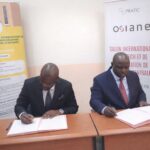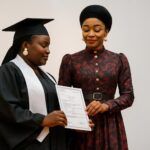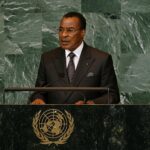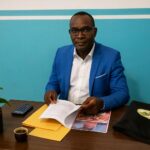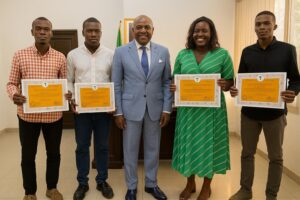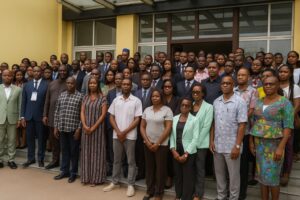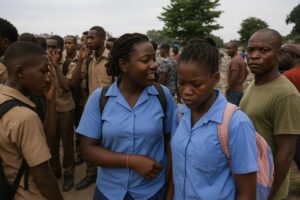Historic campus on the horizon
On 23 September, amid blue-and-white balloons at the Institute of Deaf Youth in Brazzaville, coordinator Abbé Christophe Junior Mbani gave an announcement that could reshape countless futures: a fully fledged high school for deaf students will open in the 2025-2026 academic year.
The future lycée, the first of its kind in the Republic of Congo, will allow learners who currently stop after the Brevet d’études techniques to follow a curriculum right up to the baccalaureate, complete with sign-language-fluent teachers and adapted practical workshops.
Technical paths with real jobs
Carpentry benches, sewing machines, computer stations and graphic-design software are already sketched into the project plans. Mbani explains that these technical paths were chosen because they marry creativity with employability, giving deaf graduates a way to earn a living in a fast-changing urban economy.
Breaking the silence barrier
Yet the coordinator does not hide his frustration: “Congolese people don’t love sign language. It’s visible in the way we behave in front of a person living with this handicap,” he told visitors during the International Day of Sign Languages, observed globally on 23 September.
Mbani underlined that even many parents of deaf children cannot sign a simple “bonjour” at home, leaving youngsters to navigate isolation in their own families. Saturday classes at the Institute therefore remain open to any Congolese citizen willing to invest two hours a week in learning to sign.
The International Day, proclaimed by the United Nations in 2017, focuses this year on official recognition and promotion of sign languages as a pillar of inclusion. For Mbani, the theme resonates loudly: “A language you don’t understand is a wall; learning it turns that wall into a door.”
Funding the dream
Financially, the wall is steep. The Institute welcomes children from low-income households, and some struggle to pay the modest 10,000-franc CFA enrolment fee. Feeding boarders costs roughly one bag of rice per week; fuel for the school generator is another constant expense.
To keep classes running, each room ideally needs three volunteer teachers. Recruiting and retaining qualified signers, however, is a challenge when salaries elsewhere in the city climb. Mbani has launched a public appeal for food staples, fuel vouchers and second-hand teaching materials.
His call has begun to echo in civil-society groups. A local youth collective delivered twenty litres of cooking oil after the ceremony, while a Brazzaville-based printing firm pledged to donate scrap wood for carpentry practice. “Small gestures multiplied can build a campus,” Mbani smiled.
Pushing for inclusive classrooms
Beyond charity, the Institute is lobbying the Ministry of Primary and Secondary Education to generalise inclusive classrooms nationwide. That would mean training hearing teachers in basic sign communication, seating arrangements that favour lip-reading, and accessible visual aids during lessons.
Pedagogues argue that such mixed settings benefit hearing students too, fostering patience, empathy and alternative communication skills that are valuable in customer-service industries. Countries where inclusive models have expanded report higher overall literacy rates among deaf and hearing pupils alike.
Urban parents like Mireille Ngoma see another advantage: “If my son learns next to deaf classmates, he won’t grow up fearing difference,” she said while enrolling in Saturday lessons herself. She hopes to master enough sign language to help neighbours translate pharmacy instructions.
Step-by-step construction plan
The planned high school still needs classrooms, dormitories and workshop spaces. An initial budget draft estimates 150 million francs CFA for construction and equipment. “We are staging the project, beginning with two grade levels and scaling up each year,” Mbani clarified.
Municipal authorities have signalled support in principle, pointing to the government’s broader strategy of empowering vulnerable groups through education and vocational training. While specific subsidies are yet to be announced, officials note that inclusive schooling aligns with national development goals.
A horizon that looks and listens
For now, the Institute’s courtyard remains a lively rehearsal space where students clap silently in sign applause and younger children trace ABCs on wooden slates. The promise of a lycée gives them a horizon beyond middle school, a horizon where deaf voices are seen and heard.
As dusk settled after the announcement, a teenage pupil named Armand tapped the words “baccalauréat 2028” on his phone screen and grinned. His quiet confidence captured the day’s message: with a shared effort in learning and resources, silence need not limit ambition in Brazzaville.
Observers believe the school could become a national reference centre, training future sign-language interpreters for courts, hospitals and television studios, so that Congolese public life eventually looks and sounds like everyone who lives it.


